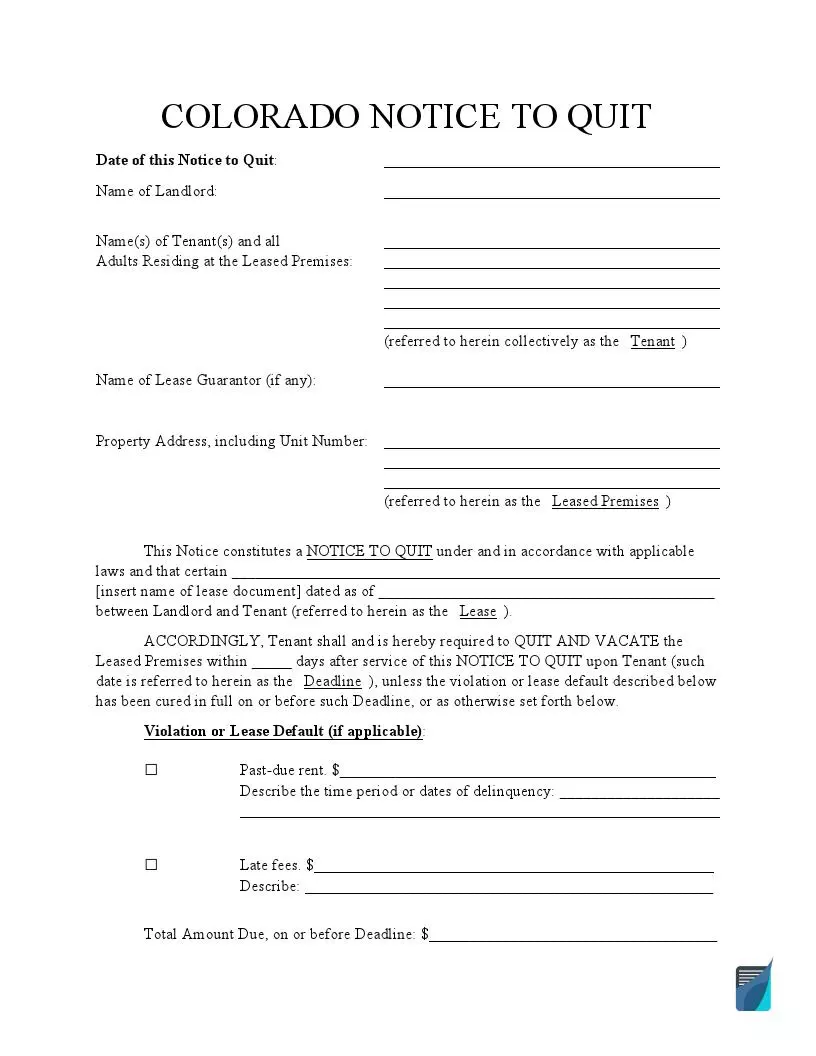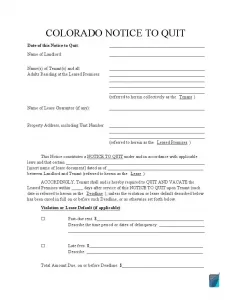Colorado Eviction Notice Forms
In Colorado, an eviction notice template is applied when the landlord discovers that the tenant has breached the agreement and wishes to proceed with a legal process of evicting them before the termination of the lease. This typically happens when the tenant does not pay the rent, but there could be other legal causes of evictions, such as breaking the agreement or committing a violent crime.
The lessor should always obey Colorado’s evicting legal procedures very carefully. If there is a mistake in the process, the Colorado courts may not grant the eviction, and the landlord will need to start the process again.

Build Your Document
Answer a few simple questions to make your document in minutes
Save and Print
Save progress and finish on any device, download and print anytime
Sign and Use
Your valid, lawyer-approved document is ready
Colorado Eviction Laws
First of all, it is important to note that the Colorado Revised Statutes contain a thorough description of the legal eviction process requirements (§13-40-101). These requirements are the law, and the rental agreements cannot contradict what is written in the Colorado Revised Statutes.
It means that if the landlord wants to include into the agreement a clause stating that they can forcefully remove the tenant from the property, they cannot do so. The Colorado Revised Statutes also require a three-day notice period for the tenant to provide their consent for the eviction, and this cannot be altered by a rental agreement.
Late rent payment is the most common reason for evictions. The tenant should remember that even if the payment is late by one day, it counts. This is why you should always keep receipts of any payments, including not just rent but also payments for any damages or repairs. If the tenant realizes that they cannot pay the rent on time, they should contact the tenant straight away and explain the situation. The Colorado state emphasizes the importance of communication between the tenant and the landlord. It has to be transparent, and all contracts should be made promptly.
For the eviction to happen, the full formal legal process should be followed in court. It is called a Forcible Entry and Detainer (FED) action that ends in obtaining a court order that requires the tenant to vacate the property.
Colorado Eviction Notice Laws Details
| Rent Grace Period | As stated in the lease |
| Notice of Non-Payment | 10 days |
| Notice of Non-Compliance | 10 days |
| State Laws | Colorado Revised Statutes, Sections 13-40-101 to 13-40-127 |
Eviction Notice Types Used in Colorado
Any notice can be delivered personally or left on the front door or somewhere where the tenant will see it. The landlord must give the tenant this type of notice before they go to court. It has to be written.
10-day Demand for Compliance Notice or Notice to Quit
This type of notice is issued for non-payment of rent or a different lease violation. If the tenant receives this notice, they should resolve the violation or vacate the property within 10 days from the day of posting.
Termination of a Month-to-Month Lease
Sometimes the tenant and the landlord agree to a month-to-month tenancy. Often there is no written agreement between the parties if the lease is month-to-month. One of the parties should give the other 21 days’ notice for the termination of such a lease.

Popular Local Eviction Notice Forms
- Printable TX notice to quit template
- Printable California (CA) notice to vacate template
- Fillable Florida eviction form
- Michigan (MI) eviction notice form
- Pennsylvania (PA) notice to quit form
- Fillable Ohio notice to vacate form
- Fillable Missouri (MO) tenant eviction notice form
- Printable Maryland notice to vacate form
Eviction Process in Colorado
Identify the Reason for Eviction
Here the landlord must determine what violation the tenant has committed that can be taken to court. Most often, this would be the following:
- a withheld rent payment
- a different lease violation
- refusal to vacate the property
- a serious offense, such as violent felony
Hand the Notice to the Tenant
This is when the tenant receives the first 10-day notice, and they have the opportunity to fix the violations. Sometimes they manage to do so (for example, by paying the outstanding rent). In such cases, the landlord cannot proceed with the eviction anymore.
File a Forcible Entry and Detainer (FED) Action
This step follows in case the tenant fails to “cure” the violations. The landlord needs to file the action in court. They do not need an attorney for this.
File the Answer
The tenant can file an answer by the return date.
Go to Court
If it came to this, the tenant and the landlord should appear in court.
Consider Other Solutions
The Colorado state encourages the tenant and the landlord to try to agree on a solution when a conflict or misunderstanding arises.
Colorado Eviction Court Forms
- A complaint in Forcible Entry and Detainer
This form is used in case the tenant has not vacated the property or fixed the issue after they have received the notice.
- Summons in Forcible Entry & Unlawful Detainer
This form comes with the Complaint and serves to notify the tenant that they have to come to court to resolve the issue.
- Answer Under Simplified Civil Procedure
The tenant needs to use this form to answer in court to the claims of the landlord.
- Stipulation in Forcible Entry & Detainer (FED) Eviction
A stipulation is filed if the parties have come to an agreement and they present it to the judge.
- Stipulation Order
A stipulation becomes an order when signed by the judge.
- Motion and Order to Set Aside Default Judgment
This motion can be used by any side in an attempt to overturn a court’s judgment.
- Writ of Restitution
If the tenant refuses to vacate the property after the required period, this form signed by the judge allows the local enforcement to remove them.
- Motion for Entry of Judgment
The landlord is entitled to a judgment by default in case the tenant has not filed their answer.
- Affidavit to Support Claim for a Breach of the Warranty of Habitability
The tenant should submit this form with their answer if they claim that they have not been paying rent because the property is not in a habitable condition.

Other important Colorado forms readily available for download here and that can be modified in our simple document maker.
Other Eviction Notice Forms by State
